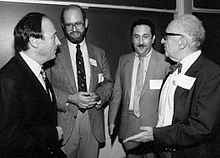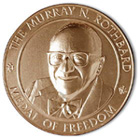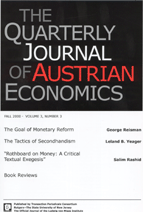| Revision as of 19:38, 26 October 2013 editAnomieBOT (talk | contribs)Bots6,585,468 editsm Dating maintenance tags: {{Undue}} {{Dubious}}← Previous edit | Revision as of 03:15, 27 October 2013 edit undoA Quest For Knowledge (talk | contribs)Extended confirmed users, Pending changes reviewers, Rollbackers24,191 edits Removed WP:BLP violation. We cannot use a blog as a source for third-party information about living people. See WP:SPS and discussion at WP:RSN for more information.Next edit → | ||
| Line 74: | Line 74: | ||
| {{undue|date=October 2013}} | {{undue|date=October 2013}} | ||
| In an article written on Institute Chairman's Lew Rockwell's website, Jacob Huebert observes that socially liberal libertarians have often accused the Mises Institute of racism. He calls the charges erroneous and argues that they might stem from the support of some Institute scholars for immigration restrictions, its support of secession, or its uncompromising stand on libertarian issues.<ref>Huebert, Jacob (December 20, 2002). LewRockwell.com</ref> |
In an article written on Institute Chairman's Lew Rockwell's website, Jacob Huebert observes that socially liberal libertarians have often accused the Mises Institute of racism. He calls the charges erroneous and argues that they might stem from the support of some Institute scholars for immigration restrictions, its support of secession, or its uncompromising stand on libertarian issues.<ref>Huebert, Jacob (December 20, 2002). LewRockwell.com</ref> | ||
| ] and ] have examined the ideology, later described by Rothbard and Rockwell as "paleo-libertarianism", which supported the founding of the Mises Institute:<blockquote> | ] and ] have examined the ideology, later described by Rothbard and Rockwell as "paleo-libertarianism", which supported the founding of the Mises Institute:<blockquote> | ||
Revision as of 03:15, 27 October 2013
 | |
| Motto | Tu ne cede malis, sed contra audentior ito Latin: Do not give in to evil but proceed ever more boldly against it |
|---|---|
| Founders | Lew Rockwell, Jr., Murray Rothbard, Burton Blumert |
| Established | 1982 |
| Mission | To advance the Misesian tradition of thought through the defense of the market economy, private property, sound money, and peaceful international relations, while opposing government intervention as economically and socially destructive. |
| Focus | Economics, Anarcho-capitalism |
| President | Lew Rockwell, Jr. |
| Faculty | 16 |
| Staff | 21 |
| Key people | Lew Rockwell, Jr. (President) Joseph Salerno (Editor Quarterly Journal of Austrian Economics) |
| Budget | Revenue: $5,704,596. Expenses: $4,547,235 |
| Location | Auburn, Alabama, United States |
| Coordinates | 32°36′24″N 85°29′28″W / 32.60667°N 85.49111°W / 32.60667; -85.49111 |
| Website | mises |
| Part of a series on the |
| Austrian School |
|---|
 |
| Principal works |
| Origins |
| Theories and ideologies |
| Organizations, universities, and think tanks |
| People |
| Variants and related topics |
|
|
The Ludwig von Mises Institute (LvMI), or "Mises Institute", is a tax-exempt libertarian organization located in Auburn, Alabama. It is named for Austrian School economist Ludwig von Mises (1881–1973). Its website states that it is dedicated to advancing "the Misesian tradition of thought through the defense of the market economy, private property, sound money, and peaceful international relations, while opposing government intervention."
The Mises Institute was founded in 1982 by Llewellyn H. Rockwell, Jr., Burton Blumert and Murray Rothbard, following a split between the Cato Institute and Rothbard, who had been one of the founders of the Cato Institute.
Background and location

- Further information: Split among the contemporary Austrian School
The Ludwig von Mises Institute was established in 1982 by Llewellyn H. Rockwell, Jr in the wake of a dispute which occurred in the early 1980s between Murray Rothbard and the Cato Institute, another libertarian organization co-founded by Rothbard. Rockwell has stated that the Mises Institute met strong opposition from parties affiliated with the Koch family, Rothbard's former backers at Cato. Rothbard was the Mises Institute's vice president and head of academic programs until his death in 1995.
The Institute stated its founding ambition: to be "the research and educational center of classical liberalism, libertarian political theory, and the Austrian School of economics". It has reprinted works by Mises, Rothbard, Hayek, and others. It presents the annual "Austrian Scholars Conference" and "Mises University", at which anarcho-capitalist thinkers meet, and Institute personnel teach and advise students. The Institute reports that its library holds nearly 35,000 volumes, including the personal library of co-founder Murray Rothbard.
Early after its founding, the Mises Institute was located at the business department offices of Auburn University, and relocated nearby to its current site in 1998. According to a story in the Wall Street Journal, the Institute chose its Auburn location for low cost of living and "good ol' Southern hospitality". The article goes on "to make an additional point", that "Southerners have always been distrustful of government," making the South a natural home for the organization's libertarian outlook. The institute has a staff of 16 Senior Fellows and about 70 adjunct scholars from the United States and other countries.
In the early years of the Mises Institute, Lew Rockwell and Murray Rothbard embraced paleolibertarianism, a culturally conservative conception of libertarianism. In a discussion of the paleolibertarian period of the Mises Institute, Austrian economist Steven Horwitz criticized what he describes as the Institute's "numerous connections with all kinds of unsavory folks: racists, anti-Semites, Holocaust deniers". On Horwitz' account, associating with these people was the product of a conscious political strategy, articulated by Llewellyn Rockwell, and rooted in Rothbard's "paleolibertarian" views formulated in the 1980s after his separation from the Koch brothers and the Cato Institute. Horwitz described the Institute's attempt to appeal to racists as part of a broader political strategy to create a "libertarian-conservative fusion" founded on cultural conservatism.
Citing and concurring with Horwitz' view of the libertarian movement of the era, Jonah Goldberg referred to the "sinful strategy adopted by so-called paleolibertarians in the 1980s. The idea was that libertarians needed to attract followers from outside the ranks of both the mainstream GOP and the libertarian movement – by trying to fuse the struggle for individual liberty with nostalgia for white supremacy. Thinkers such as Murray Rothbard hated the cultural liberalism of libertarians like the Koch brothers (yes, you read that right) and sought to build a movement fueled by white resentment."
Views espoused by founders and organization scholars
| This section may contain material not related to the topic of the article. Please help improve this section or discuss this issue on the talk page. (October 2013) (Learn how and when to remove this message) |
The Institute has published views critical of democracy, which authors in Mises Institute publications have called coercive, incompatible with wealth creation, replete with inner contradictions, and a system of legalized graft. Writers associated with the Mises Institute typically take a critical view of most U.S. government activities, foreign and domestic, throughout American history. The Institute expresses non-interventionist positions on foreign policy, asserting that war tends to increase the power of government. The Institute's website offers content which is explicitly critical of democracy, collectivism, fascism, socialism, and communism.
Mises Institute scholars hold diverse views on the subject of immigration. Walter Block argues in favor of open borders. Hans-Hermann Hoppe argues that in a stateless society individuals would only be able to travel with permission of individual land owners.
Civil War and The Confederacy
Institute scholars have condemned Abraham Lincoln's conduct of the American Civil War (e.g. suspending habeas corpus), asserting that his policies contributed to the growth of statism in the United States. Senior faculty member Thomas DiLorenzo, in his critical biographies The Real Lincoln and Lincoln: Unmasked, argues that the sixteenth president substantially expanded the size and powers of the federal government at the expense of individual liberty. Adjunct faculty member Donald Livingston shares a similar view, blaming Lincoln for the creation of "a French Revolutionary style unitary state" and "centralizing totalitarianism."
LvMI's Thomas DiLorenzo's references to the American Civil War as the "War to prevent Southern Independence" and Mises faculty member Thomas Woods's presence at the founding of the League of the South were cited by James Kirchick, writing for The New Republic, as suggesting a "disturbing attachment to the Confederacy." Woods has stated that he was present at the meeting at which the organization was founded, and later contributed to its newsletter, but that his involvement was limited.
The Southern Poverty Law Center (SPLC) has categorized the Institute as "Neo-Confederate." Lew Rockwell responded to the criticism: "The Mises Institute recently came under fire from one of these watchdog groups that claims to oppose intolerance and hate. What was our offense? We have published revisionist accounts of the origins of the Civil War that demonstrate that the tariff bred more conflict between the South and the feds than slavery. For that, we were decried as a dangerous institutional proponent of “neoconfederate” ideology. Why not just plain old Confederate ideology."
Intellectual Property
Mises Institute Senior Fellow Stephan Kinsella has written in opposition to Intellectual Property. He believes that IPRs not only violate property rights, but undermine social well-being from a utilitarian perspective.
Climate change
Articles published by the Institute have expressed doubt of the scientific consensus on climate change, and have alleged that the promise of research grants, as opposed to scientific evidence, compels climatologists to endorse that consensus.
Criticisms
| This section possibly contains original research. Please improve it by verifying the claims made and adding inline citations. Statements consisting only of original research should be removed. (October 2013) (Learn how and when to remove this message) |
| This article may lend undue weight to certain ideas, incidents, or controversies. Please help improve it by rewriting it in a balanced fashion that contextualizes different points of view. (October 2013) (Learn how and when to remove this message) |
In an article written on Institute Chairman's Lew Rockwell's website, Jacob Huebert observes that socially liberal libertarians have often accused the Mises Institute of racism. He calls the charges erroneous and argues that they might stem from the support of some Institute scholars for immigration restrictions, its support of secession, or its uncompromising stand on libertarian issues.
Julian Sanchez and David Weigel have examined the ideology, later described by Rothbard and Rockwell as "paleo-libertarianism", which supported the founding of the Mises Institute:
The most detailed description of the strategy came in an essay Rothbard wrote for the January 1992 Rothbard-Rockwell Report, titled "Right-Wing Populism: A Strategy for the Paleo Movement." Lamenting that mainstream intellectuals and opinion leaders were too invested in the status quo to be brought around to a libertarian view, Rothbard pointed to David Duke and Joseph McCarthy as models for an "Outreach to the Rednecks," which would fashion a broad libertarian/paleoconservative coalition by targeting the disaffected working and middle classes.
In a discussion about alleged racism in the Institute, former Institute Scholar Gene Callahan noted that the Institute had sought to appeal to racists for years, citing Neo-Confederate causes, but also said that "I think the truly racist time at LVMI had passed by the time ... I got there" in in the early 2000s.
The Southern Poverty Law Center classifies the Mises Institute as a hard right organization. It described Rothbard as disgusted by lesbianism and noted the anti-immigrant views of other Institute scholars.
Catholic journalist Christopher Ferrara responded in the "The Remnant" newspaper to Mises Institute scholars Llewellyn Rockwell and Mises Fellow Thomas Woods' criticism of his 2010 book The Church and the Libertarian: A Defense of the Catholic Church's Teaching on Man, Economy, and State. Ferrara criticized the Institute's outreach efforts to Catholics and its attempts to persuade them that anarcho-capitalism is compatible with Catholicism. He wrote that part of the "Institute’s mission is to sell Catholics an outrageously phony bill of goods: that a school of thought dedicated to the legacy of , a radically laissez-faire liberal agnostic who defended the legal right to starve unwanted children to death" and as being compatible with and even congenial to Catholic principles.
Publications, conferences, activities and awards


The Mises Institute has published nearly 50 books and pamphlets and archives various writings on its website. Its Quarterly Journal of Austrian Economics is dedicated to the promotion of its version of Austrian economics. It published the Journal of Libertarian Studies from 1977 to 2008.
The web-based "Are You An Austrian?" quiz is designed to test an individual's economic reasoning. It has been criticized by economists such as Arnold Kling, who wrote, "the 'Are you an Austrian?' quiz does not distinguish between knowledge of doctrine and belief in doctrine. To me, this is symptomatic of a sect, which focuses on doctrinal purity above all else. For a sect, to know is to believe, and to believe is to know."
See also
References
- ^ About The Mises Institute. Accessed November 23, 2012
- "Mises Academy: Faculty". Ludwig von Mises Institute.
- "Charity Rating". Charity Navigator.
- Secretary of State of Alabama Registration No.: 907–356 Business Entity Records
- Tax ID: 52-1263436 (public charity) Exempt Organizations Select Check, Internal Revenue Service
- Boettke, Peter (Fall/Winter 1988). "Economists and Liberty: Murray N. Rothbard" (PDF). Nomos. American Society for Political and Legal Philosophy: 29–34, 49–50. ISSN 0078-0979. OCLC 1760419.
{{cite journal}}: Check date values in:|date=(help) - Utley, Jon Basil (May 4, 2009). "Freedom fighter". The American Conservative. ISSN 1540-966X. Retrieved September 16, 2013 (from HighBeam Research).
In memoriam.
{{cite journal}}: Check date values in:|accessdate=(help) - At the time, Rockwell was chief of staff for U.S. Congressman Ron Paul. See: Berlau, John "Now playing right field – Rep. Ron Paul – Interview" Insight on the News. February 10, 1997; and Hayes, Christopher, The Nation, "Ron Paul's Roots", December 6, 2007, retrieved January 14, 2008
- Rockwell, Lew. "Libertarianism and the Old Right." Mises.org. August 5, 2006.
- Stromberg, Joseph (August 2, 2000). "Raimondo on Rothbard and Rothbard on Everything". Retrieved January 10, 2010.
- Gordon, David (April 22, 2008). "The Kochtopus vs. Murray N. Rothbard". LewRockwell.com. Retrieved November 17, 2011.
- "About the Mises Institute." Mises.org
- "About the Mises Institute." Mises.org
- "Ward & Massey Libraries". Mises.org. Retrieved November 13, 2011.
- "The Mises Campus". Mises.org. Retrieved November 13, 2011.
- Wingfield, Kyle. "Auburnomics: Von Mises finds a sweet home in Alabama." Wall Street Journal. August 11, 2006.
- "Faculty Members". Mises.org. Retrieved November 13, 2011.
- Dalmia, Shikha (December 25, 2011). "The Right Way for Ron Paul to Respond to Newsletter Controversy." Reason
- Liberty Magazine Vol. 3 No.3, 1990, page 34. http://mises.org/journals/liberty/Liberty_Magazine_January_1990.pdf
- Goldberg, Johan. "Rand Paul's Paleo Problem". National Review. Retrieved September 1, 2013.
- ^ Christopher Mayer. "Democracy is Coercive". Cite error: The named reference "url" was defined multiple times with different content (see the help page).
- "Does Democracy Threaten the Free Market? – N. Joseph Potts – Mises Institute".
- "Chapter 5 – Binary Intervention: Government Expenditures (continued)".
- "Immigration Symposium" (PDF). Retrieved November 13, 2011.
- "A Libertarian Case for Free Immigration" (PDF). Retrieved November 13, 2011.
- "The Case for Free Trade and Limited Immigration" (PDF). Retrieved November 13, 2011.
- Beirich, Heidi and Mark Potok. "The Ideologues." Intelligence Report. Southern Poverty Law Center. Winter 2004.
- Kirchick, James. "Angry White Man." The New Republic. January 8, 2008. , reprinted at
- LewRockwell.com Blog: In Case You Were Wondering
- Cathy Young from the June 2005 issue. "Reason Magazine – Behind the Jeffersonian Veneer". Reason.com. Retrieved November 13, 2011.
{{cite web}}: CS1 maint: numeric names: authors list (link) - "The Neo-Confederates". Intelligence Report. Southern Poverty Law Center. Summer 2000, Issue 99.
{{cite web}}: Check date values in:|date=(help) - Rockwell, Lew (2003). Speaking of Liberty (PDF). Ludwig von Mises Institute. p. 362. ISBN 9780945466383. OCLC 54794604.
- Kinsella, Stephan (September 4, 2009). "The Case Against IP: A Concise Guide." Mises.org
- Gordon, David (2008). "Red Hot Lies: How Global Warming Alarmists Use Threats, Fraud, and Deception to Keep You Misinformed." The Mises Review
- Evans, David M.W. (February 24, 2012). "The Skeptic's Case." Mises.org
- Huebert, Jacob (December 20, 2002). "Never Trust a Left-Libertarian." LewRockwell.com
- Julian Sanchez and David Weigel. "Who Wrote Ron Paul's Newsletters?". Reason. Retrieved September 1, 2013.
- Callahan, Gene (January 2, 2012). "Murphy on LVMI". La Bocca della Verità.
- Berlet, Chip (Summer 2003). "Into the Mainstream". Intelligence Report, Issue Number 110. Southern Poverty Law Center. Retrieved September 24, 2013.
It also promotes a type of Darwinian view of society in which elites are seen as natural and any intervention by the government on behalf of social justice is destructive. The institute seems nostalgic for the days when, 'because of selective mating, marriage, and the laws of civil and genetic inheritance, positions of natural authority likely to be passed on within a few noble families.'
- Christopher, Ferrara (June 24, 2011). "Fury in the Cult of Rothbard". The Remnant. Retrieved September 4, 2013.
- The Church and the Libertarian: A Defense of the Catholic Church's Teaching on Man, Economy, and State (2010) ISBN 978-1890740160 OCLC 670143508
- "Mises Institute Books".
- "The Quarterly Journal of Austrian Economics".
- "Journal of Libertarian Studies".
- "Are you an Austrian?". Mises.org. Retrieved November 13, 2011.
- Kling, Arnold. "The Sect of Austrian Economics" TechCentralStation Daily. November 11, 2003.
External links
- The Ludwig von Mises Institute
- EDIRC listing (provided by RePEc)
- The Mises.org Circle Bastiat (blog), also linked at CSM: The Circle Bastiat partnered with The Christian Science Monitor
- "Quickview" data from GuideStar